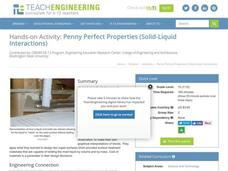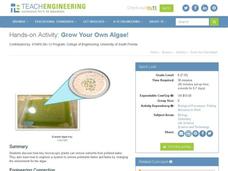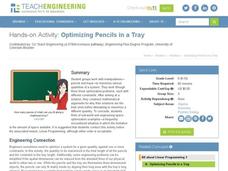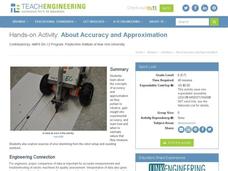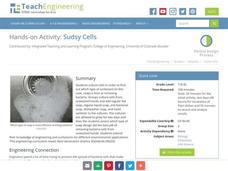Teach Engineering
Pointing at Maximum Power for PV
Following detailed directions, teams collect the voltage and current outputs of a photovoltaic cell by adjusting the resistance. Using the collected data, they determine the highest power output. Implications for weather and a large...
Teach Engineering
Penny Perfect Properties (Solid-Liquid Interations)
I can get more water to stay on a penny than you can! Collaborative pairs determine the volume of liquids that can be contained on the surface of copper pennies and plastic coins. The pairs analyze their results using graphs and go on to...
Teach Engineering
Cartesian Diver
Amaze your scholars with an activity that uses a Cartesian diver to demonstrate Pascal's Law, Archimedes' Principle, and the Ideal Gas Law. Groups then repeat the process and make their own diver move up and down in a bottle.
Teach Engineering
Rock and Boat
Present the class with a question on whether the water level of a pond will rise they take a large rock out of a boat and drop it into the pond. Groups come down on all sides of the question and try to justify their answers. The activity...
Teach Engineering
Combustion and Air Quality: Emissions Monitoring
Help your class determine the types of pollutants coming from vehicle exhaust. Groups use an air quality monitor to determine the emissions from different vehicles, to gain knowledge about combustion energy, and to predict how the...
Teach Engineering
Heart to Heart
Begin a unit on the heart, the parts and the function of the heart, and about heart disease with a resource that includes a lecture, a PowerPoint presentation, and research information. The lesson is the first of a four-part series and...
Teach Engineering
Searching for Bigfoot and Others Like Him
Individuals create a GIS data layer in Google Earth that displays information about where one might find seven different cryptids. The class members research to find data on cryptid sightings they can include in their data layer.
Teach Engineering
Creepy Silly Putty
It might be silly to determine the creep rate of putty but groups will enjoy making different formulations of silly putty and playing with them to understand how the different mixtures behave. The second part of the activity has groups...
Teach Engineering
Preconditioning Balloons: Viscoelastic Biomedical Experiments
What does stretching a balloon have to do with equilibrium? Groups explore preconditioning by stretching a balloon to a point of equilibrium. They then measure the amount of force required to stretch the balloon to the same point several...
Teach Engineering
Magnetic or Not?
The class must determine the magnetic properties of different materials, including aluminum and steel by sorting through materials using a magnet. Groups make a prediction on whether a material is magnetic and then perform tests to...
Teach Engineering
Red Cabbage Chemistry
Using the natural pH indicator of red cabbage juice, groups determine the pH of different everyday liquids. As they work, pupils gain an understanding of pH that may help deal with contaminants in the water supply.
Teach Engineering
Surface Tension Lab
What constitutes a good soap bubble? In the second installment of a nine-part series, scholars apply their understanding of surface tension to soap bubbles. They experiment to determine the best solutions to use for the...
Teach Engineering
Restriction Enzymes and DNA Fingerprinting
Show your class why restrictions aren't always a bad thing. In the third segment of a four-part series, the instructor develops the idea of restriction enzymes. Pupils learn how scientists use restriction enzymes in DNA analysis and DNA...
Teach Engineering
Design Step 3: Brainstorm Possible Solutions
Our young scientists have now specifically identified a problem, and this step helps them think of possible solutions. An outline, including guidelines, for brainstorming helps scholars stay on the right path. The resource includes...
Teach Engineering
Grow Your Own Algae!
Develop a model of a wastewater treatment center. The last activity of the unit has pupils mix a lake water sample into a tank of water containing fertilizers. Over time, the algae from the lake water grows and removes the nutrient-rich...
Teach Engineering
Optimizing Pencils in a Tray
What do you call a story about a broken pencil? Pointless. Scholars may not be telling stories when using the resource, but they are solving optimization problems involving the maximum number of pencils that can fit on a tray. They...
Teach Engineering
Statistical Analysis of Flexible Circuits
Scholars connect statistical analysis with flexible electric circuits. They first learn about flexible circuits and their applications through a PowerPoint presentation and then consider how the fabrication process for these circuits...
Teach Engineering
About Accuracy and Approximation
How accurate are robots? Groups draw lines by moving robots backwards and forwards by one rotation of the wheels. Using the appropriate formula, they determine the percent error in the length of the lines in relation to the calculated...
Teach Engineering
Fun Look at Material Science
Introduce materials science with a class demonstration. After showing a PowerPoint presentation on materials and their properties, instructors provide a ceramic tile, a Popsicle stick, a paper clip, and a plastic bag as examples of...
Teach Engineering
Bone Density Math and Logarithm Introduction
What do logarithms have to do with bone density? Scholars learn that the equation for bone density includes logarithms. The majority of the third lesson of seven is devoted to logarithms and their properties.
Teach Engineering
Close Encounters of the Polymer Kind
A PowerPoint presents features of polymers and two of its categories (thermoplastics and thermosets). Instructors conduct demonstrations to illustrate the Weissenberg Effect and the Barus & Kaye Effects of polymers in the first of...
DiscoverE
Paper Tower
Read all about it! Challenge your class to build taller and stronger. Newspapers provide the means to build towers in a simple activity. Scholars try to build as tall a tower as possible with just two sheets of newspaper.
Teach Engineering
Corn for Fuel?!
Can corn power the world? Young scientists learn about how corn and other plants can provide renewable biofuels in the second of nine lessons. They set up an experiment to investigate how different variables affect plant growth. All of...
Teach Engineering
Sudsy Cells
Let's hope that your soap is doing what it's supposed to! The second of six installments in the Cells unit has scholars perform an experiment cultivating bacteria in Petri dishes. They test soaps and detergents to see which is most...



